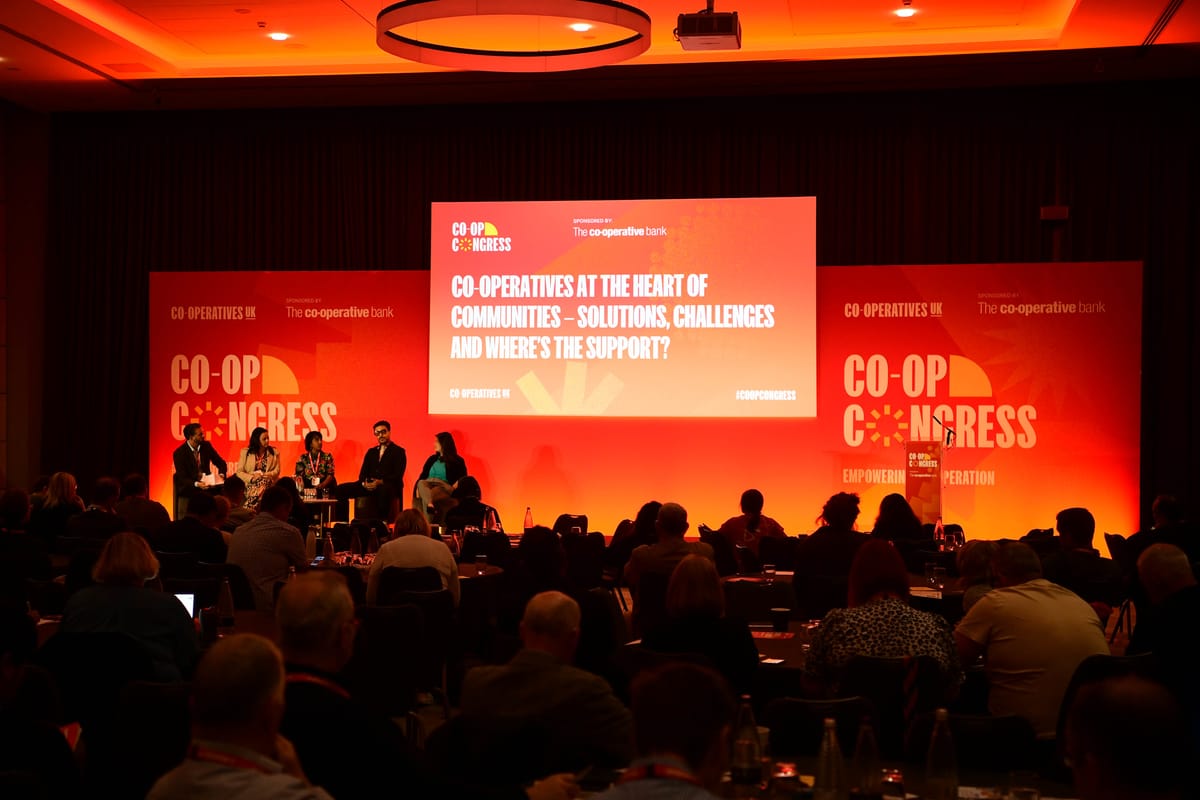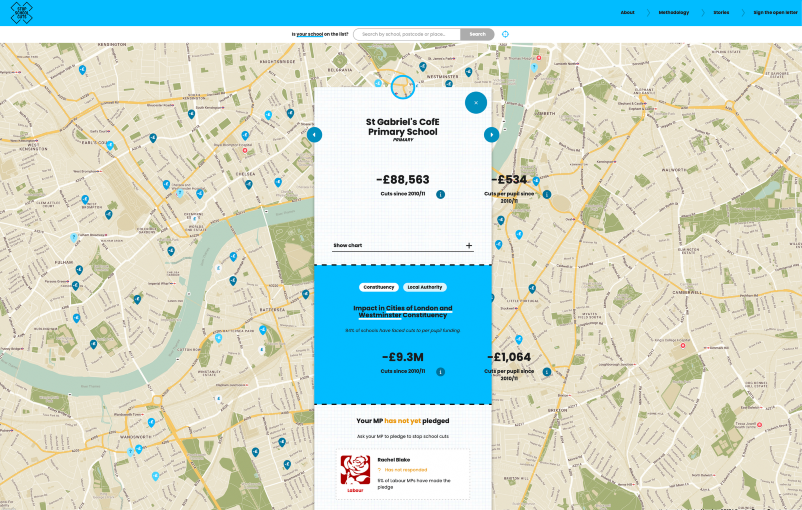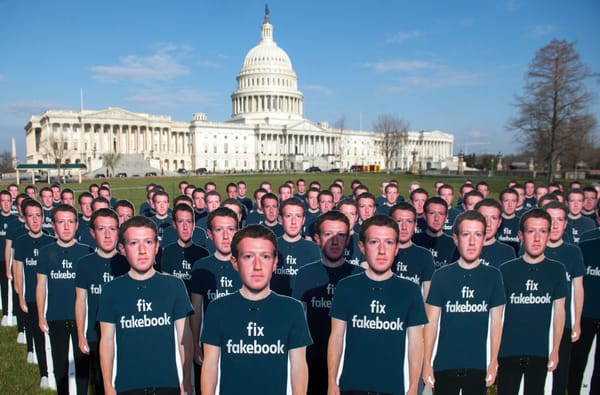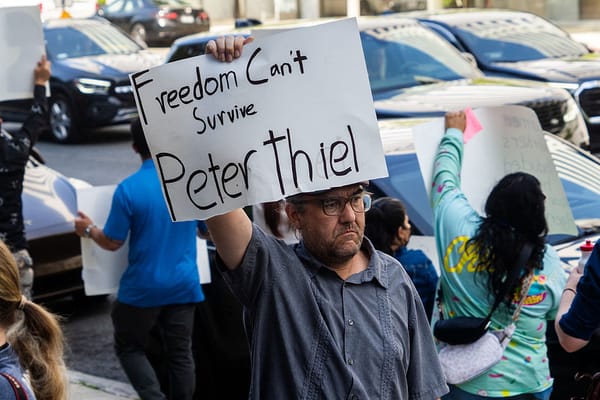Cooperatives, an antidote to Big Tech?
Worker tech co-ops taking on Big Tech, one project at a time.

Back in 2017, then UK Prime Minister Theresa May called a snap election. Seizing the opportunity, the National Education Union (NEU) pushed the School Cuts campaign against the slashing of school funding that the Conservative government had overseen.
Built on an existent prototype project by UK cooperative Outlandish, the union wanted to raise awareness on how defunding schools in relatively well funded areas to give to less funded ones was not an effective policy. The NEU believed that the government should inject more into underfunded schools and wanted to highlight the overall funding cuts since 2010. So right before elections, Outlandish and another cooperative, The Small Axe, got to work.
Outlandish built an interactive website where users could access information about schools across England, get a snapshot of funding — including funding per pupil, information on candidates’ positioning on the issue, and more. The Small Axe ran marketing and the site had 670,000 visitors and nearly 3 million page views in the run up to elections.

According to a survey conducted post elections, hundreds of thousands of people changed their vote as the issue of school funding climbed the election agenda.
What was an in-house project within a small co-op inspired the largest education union in the country and had real political impetus. The tool, created and funded initially by Outlandish, was shared with the union to serve a larger purpose, something a Big Tech company designed to profit from data would never do.
Outlandish and The Small Axe are among several worker tech cooperatives in the UK — that develop projects predominantly with councils and charities — driven by a certain social and moral consciousness. They believe in a democratic ethos and non-hierarchical workplace, where workers own and run the organisation. Every member has an equal say, a far cry from the exploitative worker practices of Big Tech.
“By giving everybody legal control of the business, [a co-op] creates a culture where everybody feels responsible for sales, sustainability and bringing in new ideas. It also gives people this feeling of empowerment that if they wanted to take the business to a new direction, or if they wanted to do a project which they felt passionate about, that they could do that,” says Polly Robbins, member of Outlandish.
Not only do co-operatives work in an internal democracy, they run in the spirit of cooperation with other co-ops. In the UK, Co-Tech, a major “network of ethical tech, digital and creative co-operatives”, is made of 37 different co-ops that collaborate on projects, supporting each other and sharing skills.
Animorph, an innovative software development co-op that, among other things, has built AR and VR applications for physical and mental health support, is one such example. As a young organisation, they received space and support from Space4, a co-op coworking space run by Outlandish, enabling them to grow and build a portfolio of high quality work.
Outlandish started Space4 to support other cooperatives so they would have affordable or even free spaces to work from while they built their organisation. Animorph, and Founder and Coders, among others, are co-ops that have benefited from this shared space and access to networks.
In this way, through mutual support and collaboration, many of these coops have been able to take on bigger projects without having to rely on venture capital; which fuels mainstream tech culture.
“One of the main problems with Big Tech is angel investment and the startup culture — boom and bust cycle — that is not designed particularly to create sustainable long-term businesses that are trying to fix long-term problems,” says Natasha Natarajan, member of Outlandish.
In fact, according to Cooperatives UK’s 2024 report, co-ops happen to be far more resilient than other businesses: 83.3% of co-operatives survive the initial five years while only 38% of other businesses do.
“Co-ops are twice as resilient as the private sector,” says Ben Philp from Creative Coop. He further explains that clients still end up with high quality work, but the money they spend either goes back into growing the co-op itself and supporting the people actually doing the work, or goes into cheaper fees on projects. This means that cooperatives often work with third sector clients and charities who are short on funding. So not only do they enable other co-ops to thrive, they contribute to an ecosystem of shared values, supporting nonprofits and charities as well.
The benefits of the co-op tech worker movement doesn’t stop here. Unlike Big Tech firms that operate in secrecy, cooperatives believe in “radical transparency”.
“For example, at the [Co-Tech] event we were at the other week, we were all sharing [insights]. If you were in a corporate environment, that would be considered highly sensitive information; like how much we charge our clients; how much we pay our staff; all of that,” says Robbins.
“And there's also this culture which I think goes hand-in-hand with the transparency thing… that it should be human centred and therefore you should bring your whole self to work,” she added.
But running a co-op is not without its challenges. While worker tech co-ops in the UK have found a way to network and collaborate on projects, they still find it difficult to scale.
“There aren’t many co-ops that have been able to scale, because you are up against rich capital funders who can pump loads and loads of money into [Big Tech] platforms, and run at a loss for years. Co-ops cannot do that,” Robbins explains.
But capital funding is not the only issue. Cooperatives are being hurt directly by Big Tech’s “greenwashing” attempts.
“There are loads of companies that are greenwashing their portfolios. So they're working for Shell and then they think, right, this doesn't look very good so we will do a free project for someone like Good Cause. But then that's affecting agencies like ours that specialise in doing social good,” says Philp.
While Big Tech companies use these projects as a cover, still making big money through unethical clients, co-ops that dedicatedly try to work with ethical, third sector clients are being hit.
“It is all these people trying to make their stuff look good which 10-15 years ago no one was bothered about, whereas now they see the value. If you only got oil companies and banks [as clients], it's not very attractive. So they'll get their mega money in and then like offset that by doing some nice stuff sometimes,” Philp explains.
Despite this, co-ops are an active counter-culture to Big Tech, providing ways to reorganise work and workplace for the benefit of all employees, fostering a cooperative and democratic culture, showing that businesses need not hurt workers and the environment but can foster community and drive social good.
But the clash of culture between cooperatives and Big Tech is not the only tension. Natarajan points out that we live in a world that fosters an individualistic entrepreneurial mindset.
Natarajan says, “Having joined a co-op now, I can see that there is a huge, huge tension between the culture of our times, which is to be a creative entrepreneur and earn loads of money and be your own boss, and the extra effort that it takes to work cooperatively with other people.”
“Ideally we want coops in every industry. But it comes up significantly in Big Tech because it is the worst manifestation of capitalism right now,” she added.
Editor’s note: In the spirit of transparency, we would like to flag that the author of the piece works out of Space4, a co-op coworking space run by Outlandish. She says, “Some of the people featured in this piece are friends; but I have portrayed their work and spirit with extreme honesty. It was written so people know that alternatives to Big Tech exist, can be imagined and made possible. People do cooperate and beautiful things can come out of it; whatever the Zuckerbergs, Musks and Bezos’ of the world would have you believe.”




